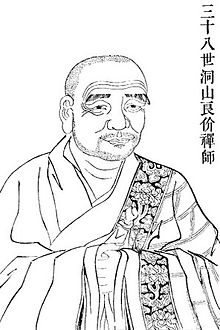Dongshan Liangjie
| Dongshan Liangjie | |
|---|---|
 |
|
| Religion | Chan Buddhism |
| School | Caodong school (曹洞宗, J. Sōtō) |
| Personal | |
| Nationality | Chinese |
| Born | 807 China |
| Died | 869 |
| Senior posting | |
| Title | Chan master (禅師) |
| Predecessor | Yunyan Tansheng |
| Successor | Yunju Daoying / Caoshan Benji (the latter's branch discontinued) |
| Religious career | |
| Teacher | Yunyan Tansheng |
| Students | (other than successors) Longya Judun Jiufeng Puman Qinshan Wensui Yuezhou Qianfeng Qinglin Shiqian Shushan Kuangren |
| Works | Song of the Precious Mirror Samadhi (《寶鏡三昧歌》) (attrib.); Recorded dialogues (《洞山語録》) |
Dongshan Liangjie (807–869) (Chinese: 洞山良价; pinyin: Dòngshān Liángjiè; Wade–Giles: Tung-shan Liang-chieh; Japanese: Tōzan Ryōkai; Korean: Tongsan Lianggye; Vietnamese: Động Sơn Lương Giới) was a Chan Buddhist monk of ninth-century China. He founded the Caodong school (Chinese: 曹洞宗), which was transmitted to Japan in the thirteenth century by Dōgen and developed into the Sōtō school of Zen. Dongshan is also known for the poetic Five Ranks.
Dongshan was born during the Tang dynasty in Kuaiji (present-day Shaoxing, Zhejiang) to the south of Hangzhou Bay. His secular birth surname was Yu (兪氏).
He started his private studies in Chan Buddhism at a young age, as was popular among educated elite families of the time. At the village cloister, Dongshan showed promise by questioning the fundamental Doctrine of the Six Roots during his tutor's recitation of the Heart Sutra. Though aged only ten, he was sent away from his home village to train under Lingmo (霊黙) at the monastery on nearby Wutai Mountain (五台山). He also had his head shaved and took on yellow robes, which represented the first steps in his path to becoming a monk, ordaining as a śrāmaṇera. At the age of twenty-one, he went to Shaolin Monastery on Mount Song, where he took the complete monk's precepts as a bhikṣu.
...
Wikipedia
